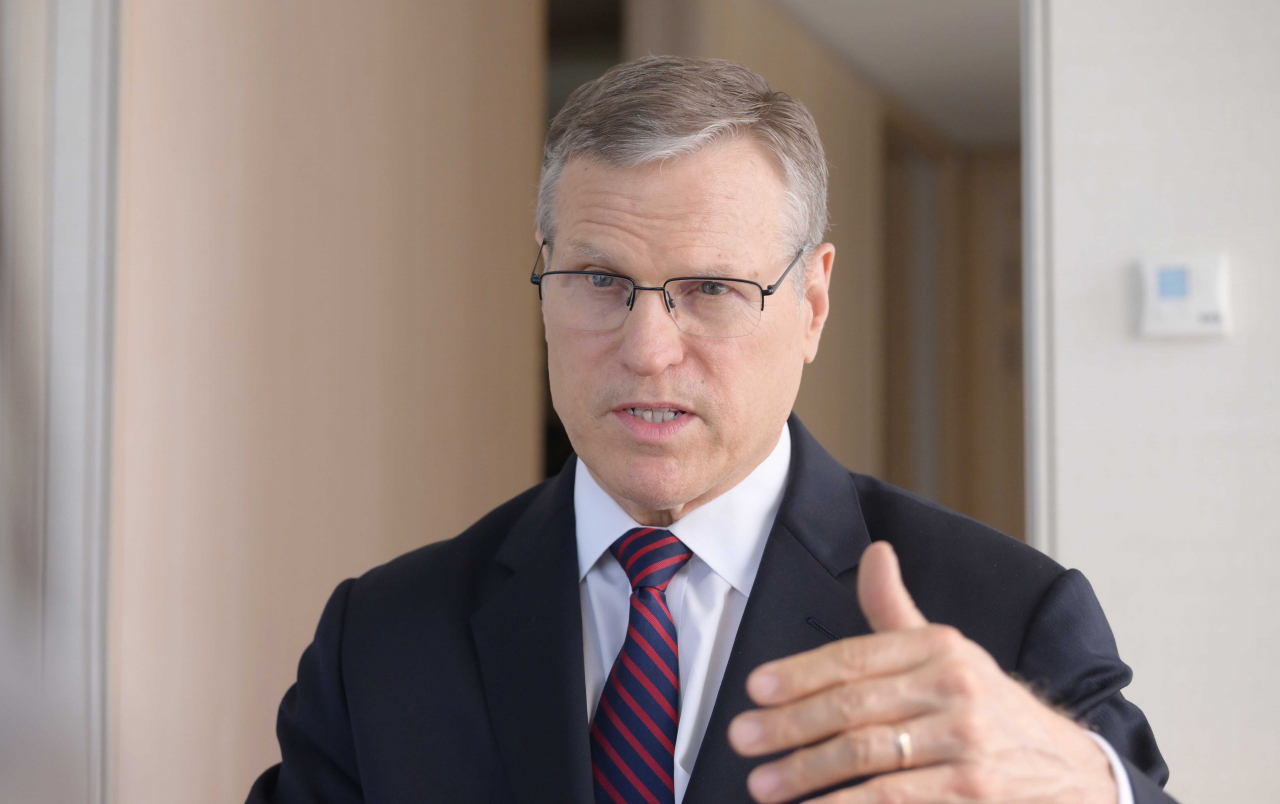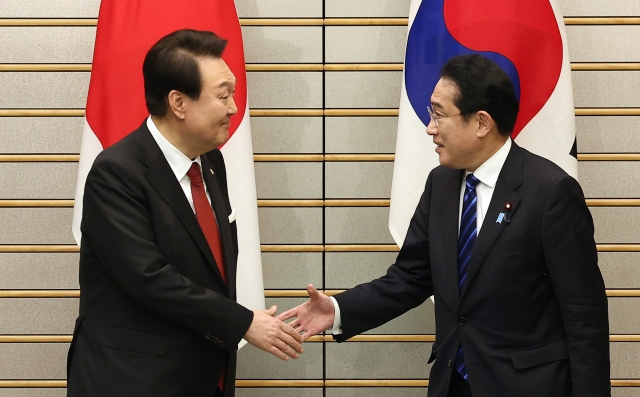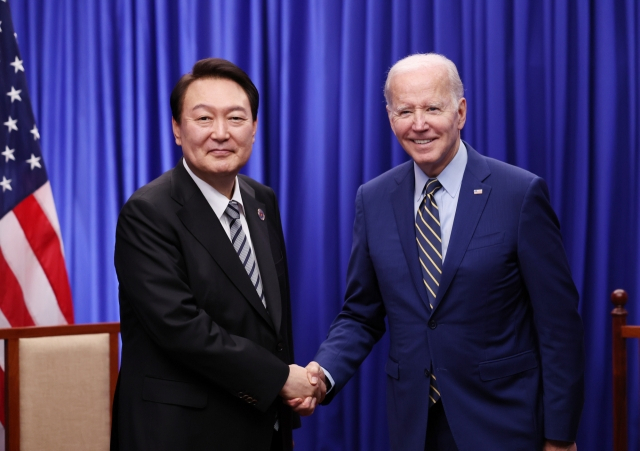3-way security partnership not necessarily for NCG, says Cronin
S. Korea, US need to institutionalize Washington Declaration, fill in details to prevent any possible reversal
By Shin Ji-hyePublished : June 15, 2023 - 13:12

South Korea, the United States and Japan should forge a trilateral security partnership amid rising tension on the peninsula, but that collaboration does not necessarily require Japan's participation in the Korea-US nuclear consultative group, according to Patrick Cronin, the Asia-Pacific security chair at the Hudson Institute.
With an upcoming trilateral summit on the horizon, expectations are high for the three countries to strengthen their security cooperation. This is the first time the leaders are meeting specifically for their own matters, rather than meeting on the sidelines of other events.
The question of Japan's inclusion in the nuclear consultative group, initially agreed upon by Seoul and Washington, remains a key concern. While Japan seeks involvement, the current US administration seems hesitant, according to Cronin.
“I think the US is trying to reassure South Korea first and foremost,” he said in an interview with The Korea Herald in Seoul last week.
The nuclear consultative group may continue as a bilateral mechanism specifically involving Seoul and Washington, he said. Trilateral security cooperation should be bolstered but, "it doesn't require Japan to be part of this Washington declaration."
It becomes very complicated when attempting to align Japan and Korea to work together, as there are numerous "political landmines," he said.
Despite the efforts of the leaders of America's two allies to improve relations for the sake of security cooperation, several contentious issues, including compensation for wartime forced laborers, territorial disputes and Fukushima wastewater, remain unresolved.
“I know it is complicated but we have no choice but in the North Korean scenarios, (it needs) to be operating both bilaterally, Korea and Japan, and then trilaterally,” he said.
In a bilateral move, Korea and Japan have normalized a previously suspended military intelligence sharing pact. In a trilateral development, defense leaders met earlier this month and agreed to establish a real-time information sharing system for North Korean missile warnings among the three nations before the end of this year.
President Yoon did not dismiss the possibility of Japan's participation when asked by a reporter during a joint press conference with Japanese Prime Minister Fumio Kishida in May whether Japan would also join the nuclear consultative group. However, he emphasized that the Washington Declaration was a bilateral agreement and should be further developed through discussions, joint planning and execution with the US.

The United States is set to select its next leader in November 2024. When questioned about the continuity of the Washington Declaration in the event of a change in the US administration, Patrick acknowledged that there is no guarantee. He explained, “It is an executive order, meaning it is the prerogative of the Biden administration. It's not a treaty.”
That is why it is crucial for both governments to establish formal institutionalization of this mechanism to make it challenging for any future US administration to reverse the move, he said.
The Korean government should move to institutionalize it to give its nation a bigger seat at the table over how to use America’s massive strategic arsenal, how to deploy it and how to think about contingency plans, he said.
It is now opportune for South Korea to "seize the moment" and “fill in the details of this mechanism that has not been defined.”
Despite announcement of the Washington Declaration, there is still demands for nuclear development in South Korea, largely driven by escalating threats from North Korea. The Korea Institute for National Unification conducted a survey between April 15 and May 10, revealing that 60.2 percent of the respondents expressed support for the development of nuclear weapons. This figure marks a decrease from 69 percent in 2022 and 71.3 percent in 2021.
When asked about the effectiveness of the Washington Declaration in deterring North Korea, he was confident.
"The answer is yes," he said.
“But I would have answered that even before the Washington Declaration. I am an optimist on deterrence. I actually believe that deterrence is actually stronger than the press suggests and than some politicians suggest. That’s the reality.”

Since the United States detonated two atomic bombs over Japan in 1945, effectively ending World War II in Asia, the international community has refrained from using nuclear weapons. This historical context highlights the significant obstacles faced by any legitimate government in actually deploying nuclear weapons and risking global outrage, he said. He believes that the likelihood of a large-scale war with nuclear powers is not high.
He said North Korea was attempting to undermine the faith of South Koreans in the idea that America would come to their aid, considering such a notion as absurd.
“We may be able to achieve our objectives with advanced conventional weapons (when the North invades the South). But believe me, North Korea will be paying a permanent end of its regime if it starts a real serious war.”
He also voiced concerns regarding the increasing cyber threats emanating from North Korea, emphasizing the need for preparedness in dealing with such threats.
“North Korea is shifting its cyber theft to gaining illicit money to fund its weapons of mass destruction. Increasingly so,” he said. “Because other means have been shut off. And this one's a big opportunity. And this is going beyond cryptocurrency.”
The Wall Street Journal reported Sunday, citing US officials, that North Korea stole about $3 billion in cryptocurrency to finance nuclear and missile development. The US deputy national security adviser, Anne Neuberger, said in July last year that North Korea finances up to a third of its missile program through cyber activities.
"The other side of that cyber threat, though, is espionage and preparing the battlefield," he said.
Testimony given by United States intelligence agencies before Congress this year has indicated that North Korea possesses the capability to disrupt critical infrastructure within the United States.
“If it has the ability to destroy US critical infrastructure, you can be sure that North Korea has the ability to disrupt South Korean critical infrastructure,” he said. "Now it may be temporary, it may be something that will be ineffective in various ways. But it's a real threat, and it's a growing threat. South Korea needs to work in cybersecurity."
Profile
Patrick M. Cronin was the senior director of the Asia-Pacific Security Program at the Center for a New American Security; senior director of the Institute for National Strategic Studies at the National Defense University, where he simultaneously oversaw the Center for the Study of Chinese Military Affairs; director of studies at the London-based International Institute for Strategic Studies. During the George W. Bush administration, he was confirmed by the US Senate as the third-highest ranking official at the US Agency for International Development. He served as an intelligence officer in the US Navy Reserve.




![[Music in drama] Rekindle a love that slipped through your fingers](http://res.heraldm.com/phpwas/restmb_idxmake.php?idx=644&simg=/content/image/2024/05/01/20240501050484_0.jpg&u=20240501151646)


![[New faces of Assembly] Architect behind ‘audacious initiative’ believes in denuclearized North Korea](http://res.heraldm.com/phpwas/restmb_idxmake.php?idx=644&simg=/content/image/2024/05/01/20240501050627_0.jpg&u=20240502093000)











![[Today’s K-pop] Stray Kids go gold in US with ‘Maniac’](http://res.heraldm.com/phpwas/restmb_idxmake.php?idx=642&simg=/content/image/2024/05/02/20240502050771_0.jpg&u=)